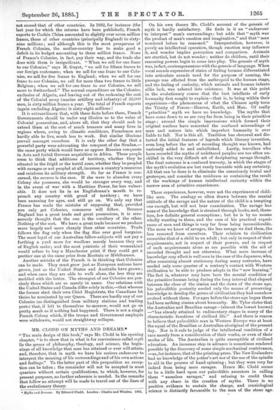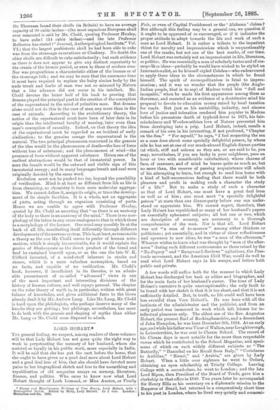MR. CLODD ON MYTHS AND DREAMS" "THE main design of
this book," says Mr. Clodd in his opening chapter, " is to show that in what is for convenience called myth lie the germs of philosophy, theology, and science, the begin- nings of all knowledge that man has attained or ever will attain, and, therefore, that in myth we have his serious endeavour to interpret the meaning of his surroundings and of his own actions and feelings." To the latter part of this proposition no excep- tion can be taken ; the remainder will not be accepted in most quarters without certain qualifications, to which, however, for present purposes, no further reference is needed. In the remarks that follow no attempt will be made to travel out of the lines of the evolutionary theory.
• Myths and Dreams. By Edward Clodd. London : Chatto and Winders. 1885. On his own theory Mr. Clodd's account of the genesis of myth is hardly satisfactory. He finds in it an " endeavour to interpret" man's surroundings ; but adds that " myth was the product of man's emotion and imagination," and that" man wondered before he reasoned." Interpretation, however, is purely an intellectual operation, though emotion may influence it, and wonder implies perception and comparison. Animals are startled, but do not wonder ; neither do children, until their reasoning powers begin to come into play. The genesis of myth was, in fact, contemporaneous with the genesis of language. When vocal sounds expressive of states of feeling became differentiated into articulate sounds used for the purpose of naming, the passage was effected from the anthropoid to the human stage, and the feeling of curiosity, which animals and human infants alike lack, was ushered into existence. It was at this point in the evolutionary course that the best intellects of early humanity first sought to explain—that is, to bring within their experiences—the phenomena of what the Chinese aptly term the Trinity of Forces—Heaven, Earth, and Man. Of really " primitive " myth we have no knowledge. The myths that have come down to us are very far from being in their primitive stage ; around the simple impressions which formed their original nucleus have concreted the confused misreadings of man and nature into which imperfect humanity is ever liable to fall. Nor is this all. Tradition has obscured and dis- torted the initial features of legends which literary invention, even long before the art of recording thought was known, had variously added to and embellished. Lastly, travellers who have recorded the myths of unlettered peoples are too often un- skilled in the very difficult art of deciphering savage thought. The final outcome is a confused travesty, in which the stages of the myth's evolution are but rarely traceable with any certainty. All that can be done is to eliminate the consciously brutal and grotesque, and consider the residuum as containing the result of the workings of human intellectual cariosity within the narrow area of primitive experiences.
These experiences, however, were not the experiences of child- like men. The analogy so often drawn between the mental attitude of the savage and the nature of the child is a tempting one enough, but will not bear examination. The savage has none of the knowledge that is strained through books, and, there- fore, few definite general conceptions ; but he is by no means wholly wanting in these, and the sum of his practical experi- ences of men and things is very far from being inconsiderable. The more we know of savages, the less savage we find them, the less removed from ourselves. Their relation to civilisation resembles that of a child to an adult ; but only in respect of their acquirements, not in respect of their powers, and in respect of such acquirements alone as are possible with the aid of recorded thought and not otherwise. What mere increase of knowledge may effect is well seen in the case of the Japanese, who, after remaining almost stationary during many centuries, have needed only some quarter of a century's contact with Western civilisation to be able to produce adepts in the " new learning." The fact is, whatever may have been the mental condition of the primitive human being during the long interval that elapsed between the close of the simian and the dawn of the stone age, his palmolithic posterity needed only the means of preserving knowledge to develop the germs of civilisation they had somehow evolved without them. For ages before the stone age began there had been nothing simian about humanity. Mr. Tylor states that the Australian and Brazilian savage—(almost the lowest known) —" has already attained to rudimentary stages in many of the characteristic functions of civilised life." And there is reason to believe that palmolithic man in Western Europe was at least the equal of the Brazilian or Australian aboriginal of the present day. Nor is it safe to judge of the intellectual condition of a race merely from a consideration of their works, or even of their modes of life. The Australian is quite susceptible of civilised education. An immense step in advance is sometimes rendered possible by the discovery of some simple mechanical contrivance, —as, for instance, that of the printing-press. The New Zealanders had no knowledge of the potter's art nor of the use of the spindle to aid in the process of hand-spinning ; but they were very far indeed from being mere savages. Hence Mr. Clodd seems to be a little hard upon our pala3olithic ancestors in calling them " nameless savages," and refusing to credit them with any share in the creation of myths. There is no positive evidence to sustain the charge, and craniological science is distinctly favourable to the men of the stone age.
Dr. Thnrnam found their skulls (in Britain) to have an average capacity of 99 cubic inches—(the most, capacious European skull ever measured is said by Mr. Clodd, quoting Professor Huxley, to have cubel 114 cubic inches)—and the late Professor RoReston has stated (" Journal, Anthropological Institute," Vol. VI.) that the largest prehistoric skull he had been able to cube was from the stone-age excavations at-Cisebury. No doubt the older skulls are difficult to cube satisfactorily ; but such evidence as there is does not appear to give any distinct superiority to the crania of the bronze period, or even to those of modern eras- Nor was prognathism a characteristic either of the bronze or of the stone-age folk ; and we may be sure that the enormous time it must have required to replace the hairy simian body by the nude trunk and limbs of man was not so -misused by Nature that a like advance did not occur in his intellect. Mr. Clodd devotes the latter half of his book to proving that dreams played the principal part in the creation of the conception of the supernatural in the mind of primitive man. But dreams alone could not do this in the case of man any more than in the case of animals. According to the evolutionary theory, the notion of the supernatural must have been of later date in its origin than the intellectual faculty of naming, later even than man's conception of causality. Indeed, on that theory the idea of the supernatural must be regarded as an incident of early civilisation ; to the genuine savage the supernatural is the natural. The two principal phenomena concerned in the genesis of the idea would be the phenomenon of death—the loss of force without loss of substance; and the phenomenon of wind—the presence of force without apparent substance. Hence one of the earliest abstractions would be that of immaterial power. In man the breath would be the outward and visible sign of this immaterial energy ; and in many languages breath and soul were originally denoted by the same word.
Evolution mast not be pushed too far, beyond the possibility of verification. Mind is at least as different from life as life is from chemistry, as chemistry is from mere molecular aggrega- tion. We cannot define it, assign its origin, or trace the develop- ment of its simple faculties. It is a whole, not an aggregate of parts, acting through an organism consisting of parts. Hence we are unable to agree with Professor Huxley, quoted by Mr. Clodd as asserting that " as there is an anatomy of the body so there is an anatomy of the mind." There is no mor- phology of the latter in any sense analogous to that in which there is a morphology of the former. One mind may possibly lie at the back of all life, manifesting itself differently through different developments of the nervous system. This is, at least, as reasonable a theory as the one Mr. Clodd seems to prefer of human auto- matism, which is simply inconceivable, for it would explain the genius of Shakespeare as the direct product of the bread and beef he sustained himself upon, or as the one the late W. K. Clifford invented, of a mind-stuff inherent in stocks and atones, which is a mere• valueless assumption, based on no facts, and capable of no verification. Mr. Clodd's book, however, if insufficient in its theories, is an admir- able presentment of so-called " advanced " views in one of the most important and interesting divisions of the history of human culture, and well repays perusal. The chapter on the solar theory of myth is, in particular, written with great
fulness of knowledge, and gives additional force to the blows already dealt it by Mr. Andrew Lang. Like Mr. Lang, Mr. Clodd is hard upon the philologists, who perhaps deserve many of the knocks they are getting ; but philology, nevertheless, has more to do both with the genesis and shaping of myths than either Mr. Lang or Mr. Clodd seem disposed to admit.



































 Previous page
Previous page